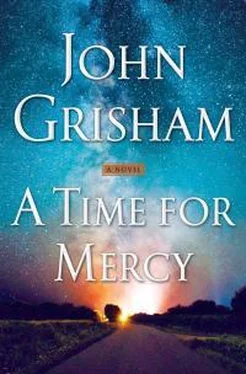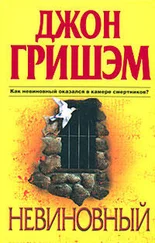“A bench trial, no jury.”
“Correct. The defense might request a jury, but Reuben will say no.”
Jake took a deep breath and said, “I need a shot of that brown stuff.”
“The bar hasn’t moved. Careful, though, or your wife might hit you.”
“My wife might be drinking too when she hears this.”
He left and returned with a Jack on ice. “If you will recall, Lucien, Harry Rex and I debated this very issue before we filed suit. I think you might have been in the room during one or two of our conversations. We decided to avoid chancery court because the Honorable Reuben Atlee is so damn tightfisted with money. To him, a hundred-thousand-dollar verdict is obscene, a violation of the rules of an orderly society. He’s a miser, a skinflint, a cheapskate. Lawyers have to beg to get a few bucks for their guardians.”
“He was generous to you during the Hubbard will contest.”
“He was, and we talked about that too. But there was so much money on the table it was easier to be generous. We filed Smallwood in circuit court because we liked our chances better with a jury.”
“True, Jake, and you wanted a big courtroom victory, a record-setting verdict that would put you on the map as a trial lawyer.”
“I did. Still do.”
“Well, you’re not getting that verdict with Smallwood, not in circuit court.”
“So, Judge Atlee wants to preside over the trial?”
“There won’t be a trial, Jake. He’ll force the railroad to settle, something he’s very good at. He did it with Hubbard.”
“He did, but after I won the trial.”
“And the settlement was fair, everybody got something, and the appeals were avoided. Right?”
“Right.”
“Same here. Refile in chancery and Reuben will take over. He’ll protect the child, and the lawyers too.”
Jake took a long sip, then closed his eyes and rocked gently. He could feel the pressure lift from his shoulders, the stress ooze from his pores. The alcohol was settling in and his breathing relaxed. For the first time in months there was a light in the distance.
The fact that Judge Atlee was sitting in the same rocker twenty-four hours earlier and telling Lucien what he should tell young Jake was difficult to absorb.
But then, it sounded just like Reuben.
54
Ozzie was waiting at the jail when Jake arrived early Saturday morning. He was cordial enough but did not offer a handshake. Mr. Zack fetched the prisoner, and Drew appeared at the desk with an army surplus duffel stuffed with everything he owned. Jake signed several forms and Drew signed an inventory sheet. They followed Ozzie through a back door to where Jake was parked. Outside, Drew stopped for a second and looked around, his first taste of freedom in almost five months. When Jake opened his driver’s door, Ozzie said, “How ’bout lunch next week?”
“I’d like that, Ozzie. Anytime.”
They drove away without being seen and five minutes later parked in Jake’s driveway. Carla met them on the patio and grabbed Drew for a long, fierce hug. They went inside to the kitchen where a feast was being prepared. Jake led him downstairs to his bathroom and gave him a towel. “Take a hot shower, as long as you want, then we’ll have breakfast.”
Drew emerged half an hour later with wet hair, wearing a cool Springsteen T-shirt, denim shorts, and a pair of brand-new Nikes, which he said fit perfectly. Jake handed him three $1 bills and said, “For blackjack. Keep the change.”
He looked at the money and said, “Come on, Jake. You don’t owe me anything.”
“Take the money. You won it fair and square, and I always pay my gambling debts.”
Drew reluctantly took the money and sat at the table where Hanna was waiting. Her first question was “What was it like in jail?”
Jake said, “No, no, we’re not talking about jail. Pick another topic.”
“It was awful,” he said.
Over the course of the summer, Drew and Carla had spent many hours together studying history and science and reading mysteries, and they had become close. She placed a plate of pancakes and bacon in front of him and ruffled his hair. “Your mom’s gonna get you a haircut as soon as you get home.”
He smiled and said, “I can’t wait. And it’s a real apartment, right?”
“It is,” Jake said. “It’s not very big but it’ll do. You’ll like it over there, Drew.”
“I can’t wait.” He crammed a piece of bacon into his mouth.
“What was the food like in jail?” Hanna asked, staring at him.
“Hanna, eat your breakfast and no talk about jail.”
Drew demolished a stack of pancakes and asked for more. At first he said little, but was soon chatting away as he ate. The pitch of his voice rose and fell and squeaked at times. He had grown at least two inches since April, and, though still rail thin, he was looking more and more like a normal teenager. Puberty was finally arriving.
When he was stuffed, he thanked Carla, gave her another fierce hug, and said he wanted to go see his mother. On the road to Oxford, he grew quiet as he took in the sights with a pleasant smile. Halfway there, he began to nod and soon fell asleep.
Jake watched him and couldn’t help but wonder about his future. He knew how precarious Drew’s freedom would be. He did not share Noose and Lucien’s confidence that a conviction was unlikely. The next trial would be different—they always were. A different courtroom, a different jury, different tactics by the State.
Regardless of a win, a loss, or another draw, Jake knew that Drew Gamble would be a part of his life for years to come.
—
ON MONDAY, Jake non-suited the Smallwood case in circuit court and sent a copy to opposing counsel. Walter Sullivan called his office three times that afternoon, but Jake was not in the mood to chat. He owed no explanation.
On Tuesday, he filed a wrongful death lawsuit in chancery court and faxed a copy to Judge Atlee.
On Wednesday, the Times, as expected, ran a front-page story under the headline “Kofer Suspect Released From Jail.” Dumas Lee did him no favors. His reporting was slanted and gave the impression that the defendant was being treated with leniency. Most galling was his reliance on comments made by former district attorney Rufus Buckley, who said, among other cheap shots, that he was shocked that Judge Noose would allow the release of a man indicted for capital murder. “It’s unheard of in this state,” Buckley said, as if he knew the history in all eighty-two counties. Not once did Dumas mention the fact that the defendant was presumed to be innocent, nor had he bothered to call Jake for a comment. Jake figured he had offered so many “No comments” that Dumas was tired of asking.
True to form, Buckley seemed to have plenty of time to talk. He had never met a reporter he didn’t like.
—
ON THURSDAY, Judge Noose convened the trial in the matter of Jake Brigance v. Ford County. The main courtroom was practically empty. The five supervisors sat together in a front row, arms crossed over their chests, their frustration evident as they all glowered at Jake, the enemy. They were veteran politicians who had ruled the county for years, with little turnover in their ranks. Each came from a specified district, a little fiefdom where the boss doled out paving contracts, equipment purchases, and jobs. As a group they were not accustomed to being shoved around, not even by a judge.
Dumas Lee was there to snoop and watch the show. Jake refused to look at him but really wanted to curse him.
His Honor began with “Mr. Brigance, you’re the plaintiff. Do you have any witnesses?”
Jake stood and said, “No, Your Honor, but, for the record, I would like to say that I was appointed by the court to represent Mr. Drew Gamble in his capital murder trial. He was and still is quite indigent. I would like to introduce into evidence my statement of fees and expenses for his defense.” Jake walked to the court reporter and handed over the paperwork.
Читать дальше












![Джон Гришэм - Апелляция [Фейк]](/books/403002/dzhon-grishem-apellyaciya-fejk-thumb.webp)